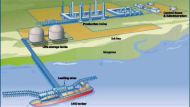ING strengthens climate commitments, further restricts finance for oil and gas

The success
ING will not provide new financing to pure-play upstream oil and gas companies that develop new fields. Besides, from 2025, ING will exclude new financing for new LNG export terminals. Although these elements are an important step in the right direction for the bank to align its business with a 1.5ºC scenario, they will only apply to a small part of ING’s oil and gas activities.
BankTrack's role
We have been actively engaging with ING to address the impact of its oil and gas financing for many years. Earlier this year, we pointed out the loopholes of ING’s previous announcement from December 2023 regarding the 2040 phase-out of its upstream oil & gas lending portfolio. Together with frontline communities, BankTrack also exposed ING’s financing of Dodgy Deals like the expansion of LNG terminals in the US Gulf.
ING, the Dutch banking giant, published yesterday its fifth climate Progress update, announcing a further strengthening of its climate commitments. Among other steps, it will stop providing new financing for new LNG export terminals after 2025, immediately stop financing pure-play upstream oil & gas companies that continue to develop new oil & gas fields, and strengthen its oversight of client’s climate transition plans, including ending business relations with clients that do not develop such plans.
These steps further strengthen the bank’s climate commitments, and the bank’s apparent willingness to consider dropping clients that do not fit in a carbon constrained world or seem unwilling to tackle their climate impact is welcome. However, the real-world impact of the announced measures may be limited, and fall short of the steps expected from a bank that considers itself a climate leader.
ING responds to massive opposition against LNG terminals
ING’s commitment regarding new LNG export terminals goes further than last year when it excluded “midstream” projects that would unlock new oil and gas fields. This new step covers all new LNG export terminals and not only those unlocking new fields. As ING is the fifth-largest financier of US LNG terminals, this is a substantial commitment.
This policy change follows years of opposition from communities and organisations in the US Gulf South and around the world. LNG terminals financed by ING have already significantly affected the health and living conditions of local communities, impacting on their rights to a healthy environment. Representatives of these communities have challenged ING on several occasions on its role as a financier of these terminals, including during the bank’s Annual General Meeting earlier this year, when activists from five countries came to Amsterdam to press the bank to stop treating their communities as “sacrifice zones”. The commitment announced today is a testament to the strength and persistence of those frontline communities.
Melanie Oldham, Director of Better Brazoria (Freeport, Texas, USA), said: “Here in the Gulf South, we’re pleased to hear that ING has responded to all of the testimonials, meetings, delegations and protests from communities who feel the devastating impacts of liquefied ‘natural’ gas (LNG) development in Texas, Louisiana and across the world. Many of my fellow Gulf Coast neighbours and I have personally travelled to Europe to make sure ING and other big banks are aware of their contribution to the destruction of our way of life. Although we’re still suffering from LNG development - with all of the pollution, the explosions, the economic inequality, the false promises and outright lies we experience - this is a heartening announcement that makes me, for one, feel like we’re being heard.”
However, ING’s commitment to no longer finance new LNG terminals still has several shortcomings.
-
First, the commitment only applies to ‘new financing’, but without a clear definition of what this signifies. This allows ING to keep refinancing existing terminals, extending their lives and continuing their damage to communities.
-
Second, the commitment will be implemented “after 2025”, meaning the bank can still finance new LNG export terminals until the end of next year, which would lead to further adverse consequences for communities and environment. While ING claims to follow the findings of the International Energy Agency’s World Energy Outlook, the IEA indicates that in a net-zero by 2050 scenario a LNG “global supply glut” in the mid-2020s will make even projects currently under construction no longer necessary.
-
Third, ING’s commitment only applies to project finance, meaning the bank can still provide general-purpose finance to companies that are developing new LNG export terminal projects.
On a positive note, ING has confirmed to us that its commitment does extend to not financing the expansion of already existing LNG export terminals, although this still needs to be publicly clarified on ING’s website.
Roishetta Ozane, Gulf South Fossil Finance Hub and Vessel Project of Louisiana (Sulphur, Louisiana, USA) commented: “This is a step in the right direction for ING. Financing fossil fuels is financing death. Death to our climate, death to communities and death to people. It is time that banks divest from fossil fuels and invest in a future where our children can breathe clean air and drink clean water. I know that this decision is because of the hard work done by frontline community members who have continuously put pressure on the financiers who are funding environmental racism in our communities.”
ING finally tackles companies developing new oil and gas projects, but sets a restrictive scope
As part of the new commitment, ING will start to exclude financing for “pure-play upstream oil & gas companies that continue to develop new fields”. The bank had already excluded project finance for new upstream oil & gas projects, but as the majority of fossil fuel financing is done through corporate loans and bond underwriting this expands the scope of the previous commitment.(1) By adopting a commitment that applies both to general corporate lending as well as debt capital market bond issuances, ING is taking a significant step forward that puts it ahead of its peers. For instance, BNP Paribas and Crédit Agricole recently announced that “they would no longer participate in issuing conventional bonds for companies involved in oil and gas extraction and production” but haven't set a similar commitment regarding corporate loans.
Nevertheless, ING’s corporate finance exclusion will only apply to a handful of its clients. According to its CEO, “it could affect 25 of ING’s clients, representing around 1 billion euros of lending”. Although pure-play clients per definition have a high carbon impact, most oil & gas companies developing new fields are not covered by ING’s definition of “pure-play upstream oil & gas companies”. This means we can expect ING to keep financing oil & gas majors with no serious transition plans, still planning on massively expanding their production.
ING’s ambition is to lead on climate. That comes with expectations
The new climate commitments announced by ING today go further than those of many of its peers, in the same way as the bank did earlier in committing to restrict finance for coal, for oil and gas projects, and for midstream infrastructure. If the same policies were to be adopted by all other banks globally, it would certainly be more difficult for the oil and gas industry to access bank finance.
That said, ING has set out its “ambition is to be a leader in accelerating the low-carbon transition”. Fulfilling this ambition would mean embracing the full urgency of the situation, and developing decisive policies that reflect that urgency. This in turn calls for policies that lead to rapid shifts in energy lending portfolios and a managed and just phase-out from the fossil fuel industry altogether. ING, with its Amsterdam headquarters located three metres below sea level and its future as a Dutch bank tied to successfully tackling the climate crisis, is in a unique position to lead the global banking sector towards adopting exactly such policies.
Notes:
(1) According to the Banking On Climate Chaos 2023 report, “project-specific” finance accounts for an average of only about 4%” of total fossil fuel expansion finance.


